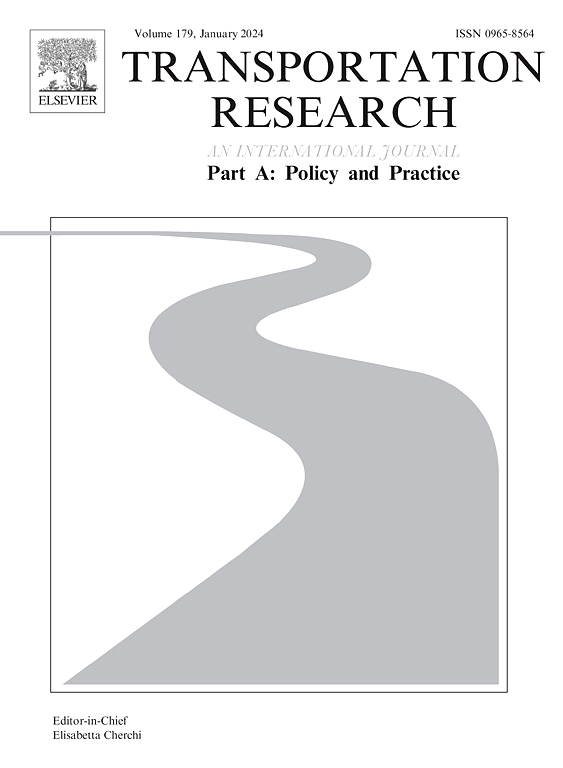How does COVID-19 pandemic affect airline’s route choice and market contact? − Full-service carriers vs. low-cost carriers in China
IF 6.3
1区 工程技术
Q1 ECONOMICS
Transportation Research Part A-Policy and Practice
Pub Date : 2024-11-05
DOI:10.1016/j.tra.2024.104291
引用次数: 0
Abstract
We empirically examine the impact of the COVID-19 pandemic on airlines’ route choices and market contact based on the Chinese domestic market over the period 2019–2022. An airline route choice model is estimated for both full-service carriers (FSCs) and Spring Airlines, China’s largest and most representative low-cost carriers (LCCs), which disentangles the “attenuating” and “persistent” effects of the pandemic on airlines’ route choices. The former effect refers to airlines exiting from extant routes in response to the sudden decline in air travel demand and strict pandemic controls, while the latter effect reflects airlines’ relatively long-term adjustment of their competition strategy triggered by the pandemic. Our empirical findings are as follows: The pandemic had a positive “persistent effect” and a negative “attenuating effect” on Spring Airlines. Spring Airlines has actively expanded its network to all types of routes, especially the dense routes connected to major airports. FSCs also adjusted their route entry strategy by entering more thin routes connected to secondary cities (i.e., a positive “persistent effect”). The pandemic has broken the equilibrium of network differentiation between FSCs and Spring Airlines in China. Spring Airlines has begun expanding services at FSCs’ major hub airports. FSCs have also tried to serve more lucrative niche routes that were previously monopolized by Spring Airlines. Overall, we observe more frequent market contact and increasing head-to-head competition between FSCs and Spring Airlines during the pandemic, when the overall traffic volume has rebounded to the pre-pandemic level. This is probably because of the airlines’ desperate need for cash flow amid financial difficulties, forcing them to intensify competition. This could have also been facilitated by more idle aircraft/airport slot capacities reallocated from the international market to the domestic market during the pandemic.
COVID-19 大流行如何影响航空公司的航线选择和市场接触?- 中国的全服务航空公司与低成本航空公司
我们基于 2019-2022 年期间的中国国内市场,实证检验了 COVID-19 大流行病对航空公司航线选择和市场接触的影响。我们对中国最大、最具代表性的低成本航空公司(LCCs)--全服务航空公司(FSCs)和春秋航空公司(Spring Airlines)的航线选择模型进行了估计,从而区分了疫情对航空公司航线选择的 "衰减 "效应和 "持续 "效应。前者是指航空公司在航空旅行需求骤减和疫情严控的情况下退出原有航线,后者则反映了疫情引发的航空公司相对长期的竞争策略调整。我们的实证研究结果如下:大流行对春秋航空产生了积极的 "持续效应 "和消极的 "衰减效应"。春秋航空积极拓展各类航线网络,尤其是连接主要机场的密集航线。同时,FSC 也调整了航线进入策略,进入更多连接二级城市的稀疏航线(即正向 "持续效应")。疫情打破了中国的固定航班服务公司与春秋航空之间的网络分化平衡。春秋航空已开始扩大其主要枢纽机场的服务范围。固定航班服务公司还尝试为利润更丰厚的小众航线提供服务,而这些航线之前被春秋航空垄断。总体而言,我们观察到,在疫情期间,当整体运输量回升至疫情前水平时,固定翼飞机公司与春秋航空公司之间的市场接触更加频繁,正面竞争也日益加剧。这可能是因为航空公司在财政困难的情况下急需现金流,迫使它们加剧竞争。在大流行病期间,更多闲置飞机/机场航班时刻容量从国际市场重新分配到国内市场,也可能促进了这种情况。
本文章由计算机程序翻译,如有差异,请以英文原文为准。
求助全文
约1分钟内获得全文
求助全文
来源期刊
CiteScore
13.20
自引率
7.80%
发文量
257
审稿时长
9.8 months
期刊介绍:
Transportation Research: Part A contains papers of general interest in all passenger and freight transportation modes: policy analysis, formulation and evaluation; planning; interaction with the political, socioeconomic and physical environment; design, management and evaluation of transportation systems. Topics are approached from any discipline or perspective: economics, engineering, sociology, psychology, etc. Case studies, survey and expository papers are included, as are articles which contribute to unification of the field, or to an understanding of the comparative aspects of different systems. Papers which assess the scope for technological innovation within a social or political framework are also published. The journal is international, and places equal emphasis on the problems of industrialized and non-industrialized regions.
Part A''s aims and scope are complementary to Transportation Research Part B: Methodological, Part C: Emerging Technologies and Part D: Transport and Environment. Part E: Logistics and Transportation Review. Part F: Traffic Psychology and Behaviour. The complete set forms the most cohesive and comprehensive reference of current research in transportation science.

 求助内容:
求助内容: 应助结果提醒方式:
应助结果提醒方式:


